- By theme
- Jesus
- The many proofs of Christ’s resurrection
- Saint Thomas Aquinas: God gave all the divine proofs we needed to believe
- The surpassing power of Christ's word
- Lewis’s trilemma: a proof of Jesus’s divinity
- God saves: the power of the holy name of Jesus
- Jesus spoke and acted as God's equal
- Jesus' divinity is actually implied in the Koran
- Jesus came at the perfect time of history
- Rabbinical sources testify to Jesus' miracles
- Mary
- The Church
- The Bible
- An enduring prophecy and a series of miraculous events preventing the reconstruction of the Temple
- The authors of the Gospels were either eyewitnesses or close contacts of those eyewitnesses
- Onomastics support the historical reliability of the Gospels
- The New Testament was not altered
- The New Testament is the best-attested manuscript of Antiquity
- The Gospels were written too early after the facts to be legends
- Archaeological finds confirm the reliability of the New Testament
- The criterion of embarrassment proves that the Gospels tell the truth
- The dissimilarity criterion strengthens the case for the historical reliability of the Gospels
- 84 details in Acts verified by historical and archaeological sources
- The unique prophecies that announced the Messiah
- The time of the coming of the Messiah was accurately prophesied
- The prophet Isaiah's ultra accurate description of the Messiah's sufferings
- Daniel's "Son of Man" is a portrait of Christ
- The Apostles
- Saint Peter, prince of the apostles
- Saint John the Apostle: an Evangelist and Theologian who deserves to be better known (d. 100)
- Saint Matthew, apostle, evangelist and martyr (d. 61)
- James the Just, “brother” of the Lord, apostle and martyr (d. 62 AD)
- Saint Matthias replaces Judas as an apostle (d. 63)
- The martyrs
- The protomartyr Saint Stephen (d. 31)
- Polycarp, bishop of Smyrna, disciple of John and martyr (d. 155)
- Justin Martyr: philosopher and apologist (d.165)
- Saint Blandina and the Martyrs of Lyon: the fortitude of faith (177 AD)
- Saint Agatha stops a volcano from destroying the city of Catania (d. 251)
- Saint Lucy of Syracuse, virgin and martyr for Christ (d. 304)
- Saint Boniface propagates Christianity in Germany (d. 754)
- Thomas More: “The king’s good servant, but God’s first”
- The martyrdom of Paul Miki and his companions (d. 1597)
- The martyrs of Angers and Avrillé (1794)
- The Martyrs of Compiègne (1794)
- The Vietnamese martyrs Father Andrew Dung-Lac and his 116 companions (17th-19th centuries)
- He braved torture to atone for his apostasy (d. 1818)
- Blaise Marmoiton: the epic journey of a missionary to New Caledonia (d. 1847)
- The Uganda martyrs: a recurring pattern in the persecution of Christians (1885)
- José Luis Sanchez del Rio, martyred at age 14 for Christ the King (d. 1928)
- Saint Maximilian Kolbe, Knight of the Immaculate (d. 1941)
- The monks
- The Desert Fathers (3rd century)
- Saint Anthony of the Desert, a father of monasticism (d. 356)
- Saint Benedict, father of Western monasticism (d. 550)
- Saint Bruno the Carthusian (d.1101): the miracle of a hidden life
- Blessed Angelo Agostini Mazzinghi: the Carmelite with flowers pouring from his mouth (d. 1438)
- Monk Abel of Valaam's accurate prophecies about Russia (d. 1841)
- The more than 33,000 miracles of Saint Charbel Maklouf (d. 1898)
- Saint Pio of Pietrelcina (d. 1968): How God worked wonders through "a poor brother who prays"
- The surprising death of Father Emmanuel de Floris (d. 1992)
- The prophecies of Saint Paisios of Mount Athos (d. 1994)
- The saints
- Saints Anne and Joachim, parents of the Virgin Mary (19 BC)
- Saint Nazarius, apostle and martyr (d. 68 or 70)
- Ignatius of Antioch: successor of the apostles and witness to the Gospel (d. 117)
- Saint Gregory the Miracle-Worker (d. 270)
- Saint Martin of Tours: patron saint of France, father of monasticism in Gaul, and the first great leader of Western monasticism (d. 397)
- Saint Augustine of Canterbury evangelises England (d. 604)
- Saint Lupus, the bishop who saved his city from the Huns (d. 623)
- Saint Rainerius of Pisa: from musician to merchant to saint (d. 1160)
- Saint Dominic of Guzman (d.1221): an athlete of the faith
- Saint Francis, the poor man of Assisi (d. 1226)
- Saint Anthony of Padua: "everyone’s saint"
- Saint Rose of Viterbo or How prayer can transform the world (d. 1252)
- Saint Simon Stock receives the scapular of Mount Carmel from the hands of the Virgin Mary
- The unusual boat of Saint Basil of Ryazan
- Saint Agnes of Montepulciano's complete God-confidence (d. 1317)
- The extraordinary conversion of Michelina of Pesaro
- Saint Peter Thomas (d. 1366): a steadfast trust in the Virgin Mary
- Saint Rita of Cascia: hoping against all hope
- Saint Catherine of Genoa and the Fire of God's love (d. 1510)
- Saint Anthony Mary Zaccaria, physician of bodies and souls (d. 1539)
- Saint Ignatius of Loyola (d. 1556): "For the greater glory of God"
- Brother Alphonsus Rodríguez, SJ: the "holy porter" (d. 1617)
- Martin de Porres returns to speed up his beatification (d. 1639)
- Virginia Centurione Bracelli: When God is the only goal, all difficulties are overcome (d.1651)
- Saint Marie of the Incarnation, "the Teresa of New France" (d.1672)
- St. Francis di Girolamo's gift of reading hearts and souls (d. 1716)
- Rosa Venerini: moving in the ocean of the Will of God (d. 1728)
- Saint Jeanne-Antide Thouret: heroic perseverance and courage (d. 1826)
- Seraphim of Sarov (1759-1833): the purpose of the Christian life is to acquire the Holy Spirit
- Camille de Soyécourt, filled with divine fortitude (d. 1849)
- Bernadette Soubirous, the shepherdess who saw the Virgin Mary (1858)
- Saint John Vianney (d. 1859): the global fame of a humble village priest
- Gabriel of Our Lady of Sorrows, the "Gardener of the Blessed Virgin" (d. 1862)
- Father Gerin, the holy priest of Grenoble (1863)
- Blessed Francisco Palau y Quer: a lover of the Church (d. 1872)
- Saints Louis and Zelie Martin, the parents of Saint Therese of Lisieux (d. 1894 and 1877)
- The supernatural maturity of Francisco Marto, “contemplative consoler of God” (d. 1919)
- Saint Faustina, apostle of the Divine Mercy (d. 1938)
- Brother Marcel Van (d.19659): a "star has risen in the East"
- Doctors
- The mystics
- Lutgardis of Tongeren and the devotion to the Sacred Heart
- Saint Angela of Foligno (d. 1309) and "Lady Poverty"
- Saint John of the Cross: mystic, reformer, poet, and universal psychologist (+1591)
- Blessed Anne of Jesus: a Carmelite nun with mystical gifts (d.1621)
- Catherine Daniélou: a mystical bride of Christ in Brittany
- Saint Margaret Mary sees the "Heart that so loved mankind"
- Jesus makes Maria Droste zu Vischering the messenger of his Divine Heart (d. 1899)
- Mother Yvonne-Aimée of Jesus' predictions concerning the Second World War (1922)
- Sister Josefa Menendez, apostle of divine mercy (d. 1923)
- Edith Royer (d. 1924) and the Sacred Heart Basilica of Montmartre
- Rozalia Celak, a mystic with a very special mission (d. 1944)
- Visionaries
- Saint Perpetua delivers her brother from Purgatory (203)
- María de Jesús de Ágreda, abbess and friend of the King of Spain
- Discovery of the Virgin Mary's house in Ephesus (1891)
- Sister Benigna Consolata: the "Little Secretary of Merciful Love" (d. 1916)
- Maria Valtorta's visions match data from the Israel Meteorological Service (1943)
- Berthe Petit's prophecies about the two world wars (d. 1943)
- Maria Valtorta saw only one pyramid at Giza in her visions... and she was right! (1944)
- The location of Saint Peter's village seen in a vision before its archaeological discovery (1945)
- The 700 extraordinary visions of the Gospel received by Maria Valtorta (d. 1961)
- The amazing geological accuracy of Maria Valtorta's writings (d. 1961)
- Maria Valtorta's astronomic observations consistent with her dating system
- Discovery of an ancient princely house in Jerusalem, previously revealed to a mystic (d. 1961)
- Mariette Kerbage, the seer of Aleppo (1982)
- The 20,000 icons of Mariette Kerbage (2002)
- The popes
- The great witnesses of the faith
- Saint Augustine's conversion: "Why not this very hour make an end to my uncleanness?" (386)
- Thomas Cajetan (d. 1534): a life in service of the truth
- Madame Acarie, "the servant of the servants of God" (d. 1618)
- Blaise Pascal (d.1662): Biblical prophecies are evidence
- Madame Élisabeth and the sweet smell of virtue (d. 1794)
- Jacinta, 10, offers her suffering to save souls from hell (d. 1920)
- Father Jean-Édouard Lamy: "another Curé of Ars" (d. 1931)
- Christian civilisation
- The depth of Christian spirituality
- John of the Cross' Path to perfect union with God based on his own experience
- The dogma of the Trinity: an increasingly better understood truth
- The incoherent arguments against Christianity
- The "New Pentecost": modern day, spectacular outpouring of the Holy Spirit
- The Christian faith explains the diversity of religions
- Cardinal Pierre de Bérulle (d.1629) on the mystery of the Incarnation
- Christ's interventions in history
- Marian apparitions and interventions
- The Life-giving Font of Constantinople
- Apparition of Our Lady of La Treille in northern France: prophecy and healings (600)
- Our Lady of Virtues saves the city of Rennes in Bretagne (1357)
- Mary stops the plague epidemic at Mount Berico (1426)
- Our Lady of Miracles heals a paralytic in Saronno (1460)
- Cotignac: the first apparitions of the Modern Era (1519)
- Savona: supernatural origin of the devotion to Our Lady of Mercy (1536)
- The Virgin Mary delivers besieged Christians in Cusco, Peru
- The victory of Lepanto and the feast of Our Lady of the Rosary (1571)
- The apparitions to Brother Fiacre (1637)
- The “aldermen's vow”, or the Marian devotion of the people of Lyon (1643)
- Our Lady of Nazareth in Plancoët, Brittany (1644)
- Our Lady of Laghet (1652)
- Saint Joseph’s apparitions in Cotignac, France (1660)
- Heaven confides in a shepherdess of Le Laus (1664-1718)
- Zeitoun, a two-year miracle (1968-1970)
- The Holy Name of Mary and the major victory of Vienna (1683)
- Heaven and earth meet in Colombia: the Las Lajas shrine (1754)
- The five Marian apparitions that traced an "M" over France, and its new pilgrimage route
- A series of Marian apparitions and prophetic messages in Ukraine since the 19th century (1806)
- "Consecrate your parish to the Immaculate Heart of Mary" (1836)
- At La Salette, Mary wept in front of the shepherds (1846)
- Our Lady of Champion, Wisconsin: the first and only approved apparition of Mary in the US (1859)
- Gietrzwald apparitions: heavenly help to a persecuted minority
- The silent apparition of Knock Mhuire in Ireland (1879)
- Mary "Abandoned Mother" appears in a working-class district of Lyon, France (1882)
- The thirty-three apparitions of the Virgin Mary in Beauraing (1932)
- "Our Lady of the Poor" appears eight times in Banneux (1933)
- Fontanelle-Montichiari apparitions of Our Lady "Rosa Mystica" (1947)
- Mary responds to the Vows of the Polish Nation (1956)
- Zeitoun apparitions
- The Virgin Mary comes to France's rescue by appearing at L'Ile Bouchard (1947)
- Maria Esperanza Bianchini and Mary, Mary, Reconciler of Peoples and Nations (1976)
- Luz Amparo and the El Escorial apparitions
- The extraordinary apparitions of Medjugorje and their worldwide impact
- The Virgin Mary prophesied the 1994 Rwandan genocide (1981)
- Our Lady of Soufanieh's apparition and messages to Myrna Nazzour (1982)
- The Virgin Mary heals a teenager, then appears to him dozens of times (1986)
- Seuca, Romania: apparitions and pleas of the Virgin Mary, "Queen of Light" (1995)
- Angels and their manifestations
- Mont Saint-Michel: Heaven watching over France
- The revelation of the hymn Axion Estin by the Archangel Gabriel (982)
- Angels give a supernatural belt to the chaste Thomas Aquinas (1243)
- The constant presence of demons and angels in the life of St Frances of Rome (d. 1440)
- Mother Yvonne-Aimée escapes from prison with the help of an angel (1943)
- Saved by Angels: The Miracle on Highway 6 (2008)
- Exorcisms in the name of Christ
- A wave of charity unique in the world
- Saint Peter Nolasco: a life dedicated to ransoming enslaved Christians (d. 1245)
- Rita of Cascia forgives her husband's murderer (1404)
- Saint Angela Merici: Christ came to serve, not to be served (d. 1540)
- Saint John of God: a life dedicated to the care of the poor, sick and those with mental disorders (d. 1550)
- Saint Camillus de Lellis, reformer of hospital care (c. 1560)
- Blessed Alix Le Clerc, encouraged by the Virgin Mary to found schools (d. 1622)
- Saint Vincent de Paul (d. 1660), apostle of charity
- Marguerite Bourgeoys, Montreal's first teacher (d. 1700)
- Frédéric Ozanam, inventor of the Church's social doctrine (d. 1853)
- Damian of Molokai: a leper for Christ (d. 1889)
- Pier Giorgio Frassati (d.1925): heroic charity
- Saint Dulce of the Poor, the Good Angel of Bahia (d. 1992)
- Mother Teresa of Calcutta (d. 1997): an unshakeable faith
- Heidi Baker: Bringing God's love to the poor and forgotten of the world
- Amazing miracles
- The miracle of liquefaction of the blood of St. Januarius (d. 431)
- The miracles of Saint Anthony of Padua (d. 1231)
- Saint Pius V and the miracle of the Crucifix (1565)
- Saint Philip Neri calls a teenager back to life (1583)
- The resurrection of Jérôme Genin (1623)
- Saint Francis de Sales brings back to life a victim of drowning (1623)
- Saint John Bosco and the promise kept beyond the grave (1839)
- The day the sun danced at Fatima (1917)
- Pius XII and the miracle of the sun at the Vatican (1950)
- When Blessed Charles de Foucauld saved a young carpenter named Charle (2016)
- Reinhard Bonnke: 89 million conversions (d. 2019)
- Miraculous cures
- The royal touch: the divine thaumaturgic gift granted to French and English monarchs (11th-19th centuries)
- With 7,500 cases of unexplained cures, Lourdes is unique in the world (1858-today)
- Our Lady at Pellevoisin: "I am all merciful" (1876)
- Mariam, the "little thing of Jesus": a saint from East to West (d.1878)
- The miraculous healing of Marie Bailly and the conversion of Dr. Alexis Carrel (1902)
- Gemma Galgani: healed to atone for sinners' faults (d. 1903)
- The miraculous cure of Blessed Maria Giuseppina Catanea
- The extraordinary healing of Alice Benlian in the Church of the Holy Cross in Damascus (1983)
- The approved miracle for the canonization of Juan Diego Cuauhtlatoatzin (1990)
- Healed by St Charbel Makhlouf, her scars bleed each month for the benefit of unbelievers (1993)
- The miracle that led to Brother André's canonisation (1999)
- Bruce Van Natta's intestinal regrowth: an irrefutable miracle (2007)
- He had “zero” chance of living: a baby's miraculous recovery (2015)
- Manouchak, operated on by Saint Charbel (2016)
- How Maya was cured from cancer at Saint Charbel's tomb (2018)
- Preserved bodies of the saints
- Dying in the odour of sanctity
- The body of Saint Cecilia found incorrupt (d. 230)
- Saint Claudius of Besançon: a quiet leader, a calm presence, and a strong belief in the value of prayer (d. 699)
- Stanislaus Kostka's burning love for God (d. 1568)
- Saint Germaine of Pibrac: God's little Cinderella (d. 1601)
- Blessed Antonio Franco, bishop and defender of the poor (d. 1626)
- Giuseppina Faro, servant of God and of the poor (d. 1871)
- The incorrupt body of Marie-Louise Nerbollier, the visionary from Diémoz (d. 1910)
- The great exhumation of Saint Charbel (1950)
- Bilocations
- Inedias
- Levitations
- Lacrimations and miraculous images
- Saint Juan Diego's tilma (1531)
- The Rue du Bac apparitions of the Virgin Mary to St. Catherine Labouré (Paris, 1830)
- Mary weeps in Syracuse (1953)
- Teresa Musco (d.1976): salvation through the Cross
- Soufanieh: A flow of oil from an image of the Virgin Mary, and oozing of oil from the face and hands of Myrna Nazzour (1982)
- The Saidnaya icon exudes a wonderful fragrance (1988)
- Our Lady weeps in a bishop's hands (1995)
- Stigmates
- The venerable Lukarda of Oberweimar shares her spiritual riches with her convent (d. 1309)
- Florida Cevoli: a heart engraved with the cross (d. 1767)
- Blessed Maria Grazia Tarallo, mystic and stigmatist (d. 1912)
- Saint Padre Pio: crucified by Love (1918)
- Elena Aiello: "a Eucharistic soul"
- A Holy Triduum with a Syrian mystic, witnessing the sufferings of Christ (1987)
- A Holy Thursday in Soufanieh (2004)
- Eucharistic miracles
- Lanciano: the first and possibly the greatest Eucharistic miracle (750)
- A host came to her: 11-year-old Imelda received Communion and died in ecstasy (1333)
- Faverney's hosts miraculously saved from fire
- A tsunami recedes before the Blessed Sacrament (1906)
- Buenos Aires miraculous host sent to forensic lab, found to be heart muscle (1996)
- Relics
- The Veil of Veronica, known as the Manoppello Image
- For centuries, the Shroud of Turin was the only negative image in the world
- The Holy Tunic of Argenteuil's fascinating history
- Saint Louis (d. 1270) and the relics of the Passion
- The miraculous rescue of the Shroud of Turin (1997)
- A comparative study of the blood present in Christ's relics
- Jews discover the Messiah
- Francis Xavier Samson Libermann, Jewish convert to Catholicism (1824)
- Our Lady of the Miraculous Medal and the conversion of Alphonse Ratisbonne (1842)
- Max Jacob: a liberal gay Jewish artist converts to Catholicism (1909)
- Edith Stein - Saint Benedicta of the Cross: "A daughter of Israel who, during the Nazi persecutions, remained united with faith and love to the Crucified Lord, Jesus Christ, as a Catholic, and to her people as a Jew"
- Patrick Elcabache: a Jew discovers the Messiah after his mother is miraculously cured in the name of Jesus
- Olivier's conversion story: from Pesach to the Christian Easter (2000)
- Cardinal Aron Jean-Marie Lustiger (d. 2007): Chosen by God
- Muslim conversions
- He met Jesus while looking for Muhammad (1990)
- Selma's journey to baptism (1996)
- Soumia, converted to Jesus as she hears Christmas carols (2003)
- How Aïsha, a Muslim convert, found Jesus (2004)
- Amir chooses Christ, at the risk of becoming homeless (2004)
- Souad Brahimi: brought to Jesus by Mary (2012)
- Pursued by God: Khadija's story (2023)
- Buddhist conversions
- Atheist conversions
- The conversion of an executioner during the Terror (1830)
- God woos a poet's heart: the story of Paul Claudel's conversion (1886)
- From agnostic to Catholic Trappist monk (1909)
- Dazzled by God: Madeleine Delbrêl's story (1924)
- C.S. Lewis, the reluctant convert (1931)
- The day André Frossard met Christ in Paris (1935)
- MC Solaar's rapper converts after experiencing Jesus' pains on the cross
- Father Sébastien Brière, converted at Medjugorje (2003)
- Franca Sozzani, the "Pope of fashion" who wanted to meet the Pope (2016)
- Nelly Gillant: from Reiki Master to Disciple of Christ (2018)
- Testimonies of encounters with Christ
- Near-death experiences (NDEs) confirm Catholic doctrine on the Four Last Things
- The NDE of Saint Christina the Astonishing, a source of conversion to Christ (1170)
- Jesus audibly calls Alphonsus Liguori to follow him (1723)
- Blessed Dina Bélanger (d. 1929): loving God and letting Jesus and Mary do their job
- Gabrielle Bossis: He and I
- André Levet's conversion in prison
- Journey between heaven and hell: a "near-death experience" (1971)
- Jesus' message to Myrna Nazzour (1984)
- Alicja Lenczewska: conversations with Jesus (1985)
- Vassula Ryden and the "True Life in God" (1985)
- Nahed Mahmoud Metwalli: from persecutor to persecuted (1987)
- The Bible verse that converted a young Algerian named Elie (2000)
- Invited to the celestial court: the story of Chantal (2017)
- Providential stories
- The superhuman intuition of Saint Pachomius the Great
- Ambrose of Milan finds the bodies of the martyrs Gervasius and Protasius (386)
- Germanus of Auxerre's prophecy about Saint Genevieve's future mission, and protection of the young woman (446)
- Seven golden stars reveal the future location of the Grande Chartreuse Monastery (1132)
- The supernatural reconciliation of the Duke of Aquitaine (1134)
- Saint Zita and the miracle of the cloak (13th c.)
- Joan of Arc: "the most beautiful story in the world"
- John of Capistrano saves the Church and Europe (1456)
- A celestial music comforts Elisabetta Picenardi on her deathbed (d. 1468)
- Gury of Kazan: freed from his prison by a "great light" (1520)
- The strange adventure of Yves Nicolazic (1623)
- Julien Maunoir miraculously learns Breton (1626)
- Pierre de Keriolet: with Mary, one cannot be lost (1636)
- How Korea evangelized itself (18th century)
- A hundred years before it happened, Saint Andrew Bobola predicted that Poland would be back on the map (1819)
- The prophetic poem about John Paul II (1840)
- Don Bosco's angel dog: Grigio (1854)
- The purifying flames of Sophie-Thérèse de Soubiran La Louvière (1861)
- Thérèse of Lisieux saved countless soldiers during the Great War
- Lost for over a century, a Russian icon reappears (1930)
- In 1947, a rosary crusade liberated Austria from the Soviets (1946-1955)
- The discovery of the tomb of Saint Peter in Rome (1949)
- He should have died of hypothermia in Soviet jails (1972)
- God protects a secret agent (1975)
- Flowing lava stops at church doors (1977)
- A protective hand saved John Paul II and led to happy consequences (1981)
- Mary Undoer of Knots: Pope Francis' gift to the world (1986)
- Edmond Fricoteaux's providential discovery of the statue of Our Lady of France (1988)
- The Virgin Mary frees a Vietnamese bishop from prison (1988)
- The miracles of Saint Juliana of Nicomedia (1994)
- Global launch of "Pilgrim Virgins" was made possible by God's Providence (1996)
- The providential finding of the Mary of Nazareth International Center's future site (2000)
- Syrian Monastery shielded from danger multiple times (2011-2020)
- Jesus
- Who are we?
- Make a donation
< Toutes les raisons sont ici !

TOUTES LES RAISONS DE CROIRE
- Jesus
- The many proofs of Christ’s resurrection
- Saint Thomas Aquinas: God gave all the divine proofs we needed to believe
- The surpassing power of Christ's word
- Lewis’s trilemma: a proof of Jesus’s divinity
- God saves: the power of the holy name of Jesus
- Jesus spoke and acted as God's equal
- Jesus' divinity is actually implied in the Koran
- Jesus came at the perfect time of history
- Rabbinical sources testify to Jesus' miracles
- Mary
- The Church
- The Bible
- An enduring prophecy and a series of miraculous events preventing the reconstruction of the Temple
- The authors of the Gospels were either eyewitnesses or close contacts of those eyewitnesses
- Onomastics support the historical reliability of the Gospels
- The New Testament was not altered
- The New Testament is the best-attested manuscript of Antiquity
- The Gospels were written too early after the facts to be legends
- Archaeological finds confirm the reliability of the New Testament
- The criterion of embarrassment proves that the Gospels tell the truth
- The dissimilarity criterion strengthens the case for the historical reliability of the Gospels
- 84 details in Acts verified by historical and archaeological sources
- The unique prophecies that announced the Messiah
- The time of the coming of the Messiah was accurately prophesied
- The prophet Isaiah's ultra accurate description of the Messiah's sufferings
- Daniel's "Son of Man" is a portrait of Christ
- The Apostles
- Saint Peter, prince of the apostles
- Saint John the Apostle: an Evangelist and Theologian who deserves to be better known (d. 100)
- Saint Matthew, apostle, evangelist and martyr (d. 61)
- James the Just, “brother” of the Lord, apostle and martyr (d. 62 AD)
- Saint Matthias replaces Judas as an apostle (d. 63)
- The martyrs
- The protomartyr Saint Stephen (d. 31)
- Polycarp, bishop of Smyrna, disciple of John and martyr (d. 155)
- Justin Martyr: philosopher and apologist (d.165)
- Saint Blandina and the Martyrs of Lyon: the fortitude of faith (177 AD)
- Saint Agatha stops a volcano from destroying the city of Catania (d. 251)
- Saint Lucy of Syracuse, virgin and martyr for Christ (d. 304)
- Saint Boniface propagates Christianity in Germany (d. 754)
- Thomas More: “The king’s good servant, but God’s first”
- The martyrdom of Paul Miki and his companions (d. 1597)
- The martyrs of Angers and Avrillé (1794)
- The Martyrs of Compiègne (1794)
- The Vietnamese martyrs Father Andrew Dung-Lac and his 116 companions (17th-19th centuries)
- He braved torture to atone for his apostasy (d. 1818)
- Blaise Marmoiton: the epic journey of a missionary to New Caledonia (d. 1847)
- The Uganda martyrs: a recurring pattern in the persecution of Christians (1885)
- José Luis Sanchez del Rio, martyred at age 14 for Christ the King (d. 1928)
- Saint Maximilian Kolbe, Knight of the Immaculate (d. 1941)
- The monks
- The Desert Fathers (3rd century)
- Saint Anthony of the Desert, a father of monasticism (d. 356)
- Saint Benedict, father of Western monasticism (d. 550)
- Saint Bruno the Carthusian (d.1101): the miracle of a hidden life
- Blessed Angelo Agostini Mazzinghi: the Carmelite with flowers pouring from his mouth (d. 1438)
- Monk Abel of Valaam's accurate prophecies about Russia (d. 1841)
- The more than 33,000 miracles of Saint Charbel Maklouf (d. 1898)
- Saint Pio of Pietrelcina (d. 1968): How God worked wonders through "a poor brother who prays"
- The surprising death of Father Emmanuel de Floris (d. 1992)
- The prophecies of Saint Paisios of Mount Athos (d. 1994)
- The saints
- Saints Anne and Joachim, parents of the Virgin Mary (19 BC)
- Saint Nazarius, apostle and martyr (d. 68 or 70)
- Ignatius of Antioch: successor of the apostles and witness to the Gospel (d. 117)
- Saint Gregory the Miracle-Worker (d. 270)
- Saint Martin of Tours: patron saint of France, father of monasticism in Gaul, and the first great leader of Western monasticism (d. 397)
- Saint Augustine of Canterbury evangelises England (d. 604)
- Saint Lupus, the bishop who saved his city from the Huns (d. 623)
- Saint Rainerius of Pisa: from musician to merchant to saint (d. 1160)
- Saint Dominic of Guzman (d.1221): an athlete of the faith
- Saint Francis, the poor man of Assisi (d. 1226)
- Saint Anthony of Padua: "everyone’s saint"
- Saint Rose of Viterbo or How prayer can transform the world (d. 1252)
- Saint Simon Stock receives the scapular of Mount Carmel from the hands of the Virgin Mary
- The unusual boat of Saint Basil of Ryazan
- Saint Agnes of Montepulciano's complete God-confidence (d. 1317)
- The extraordinary conversion of Michelina of Pesaro
- Saint Peter Thomas (d. 1366): a steadfast trust in the Virgin Mary
- Saint Rita of Cascia: hoping against all hope
- Saint Catherine of Genoa and the Fire of God's love (d. 1510)
- Saint Anthony Mary Zaccaria, physician of bodies and souls (d. 1539)
- Saint Ignatius of Loyola (d. 1556): "For the greater glory of God"
- Brother Alphonsus Rodríguez, SJ: the "holy porter" (d. 1617)
- Martin de Porres returns to speed up his beatification (d. 1639)
- Virginia Centurione Bracelli: When God is the only goal, all difficulties are overcome (d.1651)
- Saint Marie of the Incarnation, "the Teresa of New France" (d.1672)
- St. Francis di Girolamo's gift of reading hearts and souls (d. 1716)
- Rosa Venerini: moving in the ocean of the Will of God (d. 1728)
- Saint Jeanne-Antide Thouret: heroic perseverance and courage (d. 1826)
- Seraphim of Sarov (1759-1833): the purpose of the Christian life is to acquire the Holy Spirit
- Camille de Soyécourt, filled with divine fortitude (d. 1849)
- Bernadette Soubirous, the shepherdess who saw the Virgin Mary (1858)
- Saint John Vianney (d. 1859): the global fame of a humble village priest
- Gabriel of Our Lady of Sorrows, the "Gardener of the Blessed Virgin" (d. 1862)
- Father Gerin, the holy priest of Grenoble (1863)
- Blessed Francisco Palau y Quer: a lover of the Church (d. 1872)
- Saints Louis and Zelie Martin, the parents of Saint Therese of Lisieux (d. 1894 and 1877)
- The supernatural maturity of Francisco Marto, “contemplative consoler of God” (d. 1919)
- Saint Faustina, apostle of the Divine Mercy (d. 1938)
- Brother Marcel Van (d.19659): a "star has risen in the East"
- Doctors
- The mystics
- Lutgardis of Tongeren and the devotion to the Sacred Heart
- Saint Angela of Foligno (d. 1309) and "Lady Poverty"
- Saint John of the Cross: mystic, reformer, poet, and universal psychologist (+1591)
- Blessed Anne of Jesus: a Carmelite nun with mystical gifts (d.1621)
- Catherine Daniélou: a mystical bride of Christ in Brittany
- Saint Margaret Mary sees the "Heart that so loved mankind"
- Jesus makes Maria Droste zu Vischering the messenger of his Divine Heart (d. 1899)
- Mother Yvonne-Aimée of Jesus' predictions concerning the Second World War (1922)
- Sister Josefa Menendez, apostle of divine mercy (d. 1923)
- Edith Royer (d. 1924) and the Sacred Heart Basilica of Montmartre
- Rozalia Celak, a mystic with a very special mission (d. 1944)
- Visionaries
- Saint Perpetua delivers her brother from Purgatory (203)
- María de Jesús de Ágreda, abbess and friend of the King of Spain
- Discovery of the Virgin Mary's house in Ephesus (1891)
- Sister Benigna Consolata: the "Little Secretary of Merciful Love" (d. 1916)
- Maria Valtorta's visions match data from the Israel Meteorological Service (1943)
- Berthe Petit's prophecies about the two world wars (d. 1943)
- Maria Valtorta saw only one pyramid at Giza in her visions... and she was right! (1944)
- The location of Saint Peter's village seen in a vision before its archaeological discovery (1945)
- The 700 extraordinary visions of the Gospel received by Maria Valtorta (d. 1961)
- The amazing geological accuracy of Maria Valtorta's writings (d. 1961)
- Maria Valtorta's astronomic observations consistent with her dating system
- Discovery of an ancient princely house in Jerusalem, previously revealed to a mystic (d. 1961)
- Mariette Kerbage, the seer of Aleppo (1982)
- The 20,000 icons of Mariette Kerbage (2002)
- The popes
- The great witnesses of the faith
- Saint Augustine's conversion: "Why not this very hour make an end to my uncleanness?" (386)
- Thomas Cajetan (d. 1534): a life in service of the truth
- Madame Acarie, "the servant of the servants of God" (d. 1618)
- Blaise Pascal (d.1662): Biblical prophecies are evidence
- Madame Élisabeth and the sweet smell of virtue (d. 1794)
- Jacinta, 10, offers her suffering to save souls from hell (d. 1920)
- Father Jean-Édouard Lamy: "another Curé of Ars" (d. 1931)
- Christian civilisation
- The depth of Christian spirituality
- John of the Cross' Path to perfect union with God based on his own experience
- The dogma of the Trinity: an increasingly better understood truth
- The incoherent arguments against Christianity
- The "New Pentecost": modern day, spectacular outpouring of the Holy Spirit
- The Christian faith explains the diversity of religions
- Cardinal Pierre de Bérulle (d.1629) on the mystery of the Incarnation
- Christ's interventions in history
- Marian apparitions and interventions
- The Life-giving Font of Constantinople
- Apparition of Our Lady of La Treille in northern France: prophecy and healings (600)
- Our Lady of Virtues saves the city of Rennes in Bretagne (1357)
- Mary stops the plague epidemic at Mount Berico (1426)
- Our Lady of Miracles heals a paralytic in Saronno (1460)
- Cotignac: the first apparitions of the Modern Era (1519)
- Savona: supernatural origin of the devotion to Our Lady of Mercy (1536)
- The Virgin Mary delivers besieged Christians in Cusco, Peru
- The victory of Lepanto and the feast of Our Lady of the Rosary (1571)
- The apparitions to Brother Fiacre (1637)
- The “aldermen's vow”, or the Marian devotion of the people of Lyon (1643)
- Our Lady of Nazareth in Plancoët, Brittany (1644)
- Our Lady of Laghet (1652)
- Saint Joseph’s apparitions in Cotignac, France (1660)
- Heaven confides in a shepherdess of Le Laus (1664-1718)
- Zeitoun, a two-year miracle (1968-1970)
- The Holy Name of Mary and the major victory of Vienna (1683)
- Heaven and earth meet in Colombia: the Las Lajas shrine (1754)
- The five Marian apparitions that traced an "M" over France, and its new pilgrimage route
- A series of Marian apparitions and prophetic messages in Ukraine since the 19th century (1806)
- "Consecrate your parish to the Immaculate Heart of Mary" (1836)
- At La Salette, Mary wept in front of the shepherds (1846)
- Our Lady of Champion, Wisconsin: the first and only approved apparition of Mary in the US (1859)
- Gietrzwald apparitions: heavenly help to a persecuted minority
- The silent apparition of Knock Mhuire in Ireland (1879)
- Mary "Abandoned Mother" appears in a working-class district of Lyon, France (1882)
- The thirty-three apparitions of the Virgin Mary in Beauraing (1932)
- "Our Lady of the Poor" appears eight times in Banneux (1933)
- Fontanelle-Montichiari apparitions of Our Lady "Rosa Mystica" (1947)
- Mary responds to the Vows of the Polish Nation (1956)
- Zeitoun apparitions
- The Virgin Mary comes to France's rescue by appearing at L'Ile Bouchard (1947)
- Maria Esperanza Bianchini and Mary, Mary, Reconciler of Peoples and Nations (1976)
- Luz Amparo and the El Escorial apparitions
- The extraordinary apparitions of Medjugorje and their worldwide impact
- The Virgin Mary prophesied the 1994 Rwandan genocide (1981)
- Our Lady of Soufanieh's apparition and messages to Myrna Nazzour (1982)
- The Virgin Mary heals a teenager, then appears to him dozens of times (1986)
- Seuca, Romania: apparitions and pleas of the Virgin Mary, "Queen of Light" (1995)
- Angels and their manifestations
- Mont Saint-Michel: Heaven watching over France
- The revelation of the hymn Axion Estin by the Archangel Gabriel (982)
- Angels give a supernatural belt to the chaste Thomas Aquinas (1243)
- The constant presence of demons and angels in the life of St Frances of Rome (d. 1440)
- Mother Yvonne-Aimée escapes from prison with the help of an angel (1943)
- Saved by Angels: The Miracle on Highway 6 (2008)
- Exorcisms in the name of Christ
- A wave of charity unique in the world
- Saint Peter Nolasco: a life dedicated to ransoming enslaved Christians (d. 1245)
- Rita of Cascia forgives her husband's murderer (1404)
- Saint Angela Merici: Christ came to serve, not to be served (d. 1540)
- Saint John of God: a life dedicated to the care of the poor, sick and those with mental disorders (d. 1550)
- Saint Camillus de Lellis, reformer of hospital care (c. 1560)
- Blessed Alix Le Clerc, encouraged by the Virgin Mary to found schools (d. 1622)
- Saint Vincent de Paul (d. 1660), apostle of charity
- Marguerite Bourgeoys, Montreal's first teacher (d. 1700)
- Frédéric Ozanam, inventor of the Church's social doctrine (d. 1853)
- Damian of Molokai: a leper for Christ (d. 1889)
- Pier Giorgio Frassati (d.1925): heroic charity
- Saint Dulce of the Poor, the Good Angel of Bahia (d. 1992)
- Mother Teresa of Calcutta (d. 1997): an unshakeable faith
- Heidi Baker: Bringing God's love to the poor and forgotten of the world
- Amazing miracles
- The miracle of liquefaction of the blood of St. Januarius (d. 431)
- The miracles of Saint Anthony of Padua (d. 1231)
- Saint Pius V and the miracle of the Crucifix (1565)
- Saint Philip Neri calls a teenager back to life (1583)
- The resurrection of Jérôme Genin (1623)
- Saint Francis de Sales brings back to life a victim of drowning (1623)
- Saint John Bosco and the promise kept beyond the grave (1839)
- The day the sun danced at Fatima (1917)
- Pius XII and the miracle of the sun at the Vatican (1950)
- When Blessed Charles de Foucauld saved a young carpenter named Charle (2016)
- Reinhard Bonnke: 89 million conversions (d. 2019)
- Miraculous cures
- The royal touch: the divine thaumaturgic gift granted to French and English monarchs (11th-19th centuries)
- With 7,500 cases of unexplained cures, Lourdes is unique in the world (1858-today)
- Our Lady at Pellevoisin: "I am all merciful" (1876)
- Mariam, the "little thing of Jesus": a saint from East to West (d.1878)
- The miraculous healing of Marie Bailly and the conversion of Dr. Alexis Carrel (1902)
- Gemma Galgani: healed to atone for sinners' faults (d. 1903)
- The miraculous cure of Blessed Maria Giuseppina Catanea
- The extraordinary healing of Alice Benlian in the Church of the Holy Cross in Damascus (1983)
- The approved miracle for the canonization of Juan Diego Cuauhtlatoatzin (1990)
- Healed by St Charbel Makhlouf, her scars bleed each month for the benefit of unbelievers (1993)
- The miracle that led to Brother André's canonisation (1999)
- Bruce Van Natta's intestinal regrowth: an irrefutable miracle (2007)
- He had “zero” chance of living: a baby's miraculous recovery (2015)
- Manouchak, operated on by Saint Charbel (2016)
- How Maya was cured from cancer at Saint Charbel's tomb (2018)
- Preserved bodies of the saints
- Dying in the odour of sanctity
- The body of Saint Cecilia found incorrupt (d. 230)
- Saint Claudius of Besançon: a quiet leader, a calm presence, and a strong belief in the value of prayer (d. 699)
- Stanislaus Kostka's burning love for God (d. 1568)
- Saint Germaine of Pibrac: God's little Cinderella (d. 1601)
- Blessed Antonio Franco, bishop and defender of the poor (d. 1626)
- Giuseppina Faro, servant of God and of the poor (d. 1871)
- The incorrupt body of Marie-Louise Nerbollier, the visionary from Diémoz (d. 1910)
- The great exhumation of Saint Charbel (1950)
- Bilocations
- Inedias
- Levitations
- Lacrimations and miraculous images
- Saint Juan Diego's tilma (1531)
- The Rue du Bac apparitions of the Virgin Mary to St. Catherine Labouré (Paris, 1830)
- Mary weeps in Syracuse (1953)
- Teresa Musco (d.1976): salvation through the Cross
- Soufanieh: A flow of oil from an image of the Virgin Mary, and oozing of oil from the face and hands of Myrna Nazzour (1982)
- The Saidnaya icon exudes a wonderful fragrance (1988)
- Our Lady weeps in a bishop's hands (1995)
- Stigmates
- The venerable Lukarda of Oberweimar shares her spiritual riches with her convent (d. 1309)
- Florida Cevoli: a heart engraved with the cross (d. 1767)
- Blessed Maria Grazia Tarallo, mystic and stigmatist (d. 1912)
- Saint Padre Pio: crucified by Love (1918)
- Elena Aiello: "a Eucharistic soul"
- A Holy Triduum with a Syrian mystic, witnessing the sufferings of Christ (1987)
- A Holy Thursday in Soufanieh (2004)
- Eucharistic miracles
- Lanciano: the first and possibly the greatest Eucharistic miracle (750)
- A host came to her: 11-year-old Imelda received Communion and died in ecstasy (1333)
- Faverney's hosts miraculously saved from fire
- A tsunami recedes before the Blessed Sacrament (1906)
- Buenos Aires miraculous host sent to forensic lab, found to be heart muscle (1996)
- Relics
- The Veil of Veronica, known as the Manoppello Image
- For centuries, the Shroud of Turin was the only negative image in the world
- The Holy Tunic of Argenteuil's fascinating history
- Saint Louis (d. 1270) and the relics of the Passion
- The miraculous rescue of the Shroud of Turin (1997)
- A comparative study of the blood present in Christ's relics
- Jews discover the Messiah
- Francis Xavier Samson Libermann, Jewish convert to Catholicism (1824)
- Our Lady of the Miraculous Medal and the conversion of Alphonse Ratisbonne (1842)
- Max Jacob: a liberal gay Jewish artist converts to Catholicism (1909)
- Edith Stein - Saint Benedicta of the Cross: "A daughter of Israel who, during the Nazi persecutions, remained united with faith and love to the Crucified Lord, Jesus Christ, as a Catholic, and to her people as a Jew"
- Patrick Elcabache: a Jew discovers the Messiah after his mother is miraculously cured in the name of Jesus
- Olivier's conversion story: from Pesach to the Christian Easter (2000)
- Cardinal Aron Jean-Marie Lustiger (d. 2007): Chosen by God
- Muslim conversions
- He met Jesus while looking for Muhammad (1990)
- Selma's journey to baptism (1996)
- Soumia, converted to Jesus as she hears Christmas carols (2003)
- How Aïsha, a Muslim convert, found Jesus (2004)
- Amir chooses Christ, at the risk of becoming homeless (2004)
- Souad Brahimi: brought to Jesus by Mary (2012)
- Pursued by God: Khadija's story (2023)
- Buddhist conversions
- Atheist conversions
- The conversion of an executioner during the Terror (1830)
- God woos a poet's heart: the story of Paul Claudel's conversion (1886)
- From agnostic to Catholic Trappist monk (1909)
- Dazzled by God: Madeleine Delbrêl's story (1924)
- C.S. Lewis, the reluctant convert (1931)
- The day André Frossard met Christ in Paris (1935)
- MC Solaar's rapper converts after experiencing Jesus' pains on the cross
- Father Sébastien Brière, converted at Medjugorje (2003)
- Franca Sozzani, the "Pope of fashion" who wanted to meet the Pope (2016)
- Nelly Gillant: from Reiki Master to Disciple of Christ (2018)
- Testimonies of encounters with Christ
- Near-death experiences (NDEs) confirm Catholic doctrine on the Four Last Things
- The NDE of Saint Christina the Astonishing, a source of conversion to Christ (1170)
- Jesus audibly calls Alphonsus Liguori to follow him (1723)
- Blessed Dina Bélanger (d. 1929): loving God and letting Jesus and Mary do their job
- Gabrielle Bossis: He and I
- André Levet's conversion in prison
- Journey between heaven and hell: a "near-death experience" (1971)
- Jesus' message to Myrna Nazzour (1984)
- Alicja Lenczewska: conversations with Jesus (1985)
- Vassula Ryden and the "True Life in God" (1985)
- Nahed Mahmoud Metwalli: from persecutor to persecuted (1987)
- The Bible verse that converted a young Algerian named Elie (2000)
- Invited to the celestial court: the story of Chantal (2017)
- Providential stories
- The superhuman intuition of Saint Pachomius the Great
- Ambrose of Milan finds the bodies of the martyrs Gervasius and Protasius (386)
- Germanus of Auxerre's prophecy about Saint Genevieve's future mission, and protection of the young woman (446)
- Seven golden stars reveal the future location of the Grande Chartreuse Monastery (1132)
- The supernatural reconciliation of the Duke of Aquitaine (1134)
- Saint Zita and the miracle of the cloak (13th c.)
- Joan of Arc: "the most beautiful story in the world"
- John of Capistrano saves the Church and Europe (1456)
- A celestial music comforts Elisabetta Picenardi on her deathbed (d. 1468)
- Gury of Kazan: freed from his prison by a "great light" (1520)
- The strange adventure of Yves Nicolazic (1623)
- Julien Maunoir miraculously learns Breton (1626)
- Pierre de Keriolet: with Mary, one cannot be lost (1636)
- How Korea evangelized itself (18th century)
- A hundred years before it happened, Saint Andrew Bobola predicted that Poland would be back on the map (1819)
- The prophetic poem about John Paul II (1840)
- Don Bosco's angel dog: Grigio (1854)
- The purifying flames of Sophie-Thérèse de Soubiran La Louvière (1861)
- Thérèse of Lisieux saved countless soldiers during the Great War
- Lost for over a century, a Russian icon reappears (1930)
- In 1947, a rosary crusade liberated Austria from the Soviets (1946-1955)
- The discovery of the tomb of Saint Peter in Rome (1949)
- He should have died of hypothermia in Soviet jails (1972)
- God protects a secret agent (1975)
- Flowing lava stops at church doors (1977)
- A protective hand saved John Paul II and led to happy consequences (1981)
- Mary Undoer of Knots: Pope Francis' gift to the world (1986)
- Edmond Fricoteaux's providential discovery of the statue of Our Lady of France (1988)
- The Virgin Mary frees a Vietnamese bishop from prison (1988)
- The miracles of Saint Juliana of Nicomedia (1994)
- Global launch of "Pilgrim Virgins" was made possible by God's Providence (1996)
- The providential finding of the Mary of Nazareth International Center's future site (2000)
- Syrian Monastery shielded from danger multiple times (2011-2020)
Histoires providentielles
n°26
France
1429
Joan of Arc: "the most beautiful story in the world"
The story and journey of Joan of Arc is a staggering, unprecedented epic. Her actions had a major historical impact, making it possible some time later to liberate France and put an end to the Hundred Years' War.
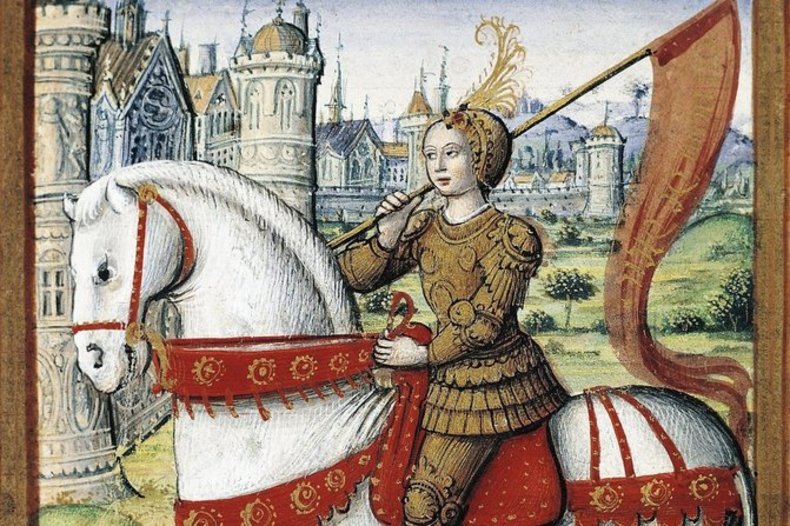
Jeanne d'Arc à cheval. Enluminure du manuscrit d'Antoine Dufour, Les vies des femmes célèbres, Nantes, musée Dobrée, 1504. ©CC0/wikimedia
Les raisons d'y croire :
- Her story is historically indisputable.
- Seventeen-year-old Joan of Arc, claiming to be guided by heavenly "voices", became the successful leader of a desperate French army that had experienced a series of defeats.
- From the very first battle, Joan's perceptive decisions led to a decisive and unexpected victory at Orleans, and to many more afterwards.
- She then set her sights on a single goal: the coronation of King Charles VII in Reims some time later, an event that would change the course of history.
- During her capture, trial and execution, Joan emerged even purer and greater than ever, through her attitude, her arguments and her testimony.
- French people of all persuasions venerate her as an extraordinary saint, a shining model and a national heroine.
- No natural explanation can account for the supernatural story of Joan of Arc.
Synthèse :
French philosopher Alain described the adventure of this young woman from Domrémy, an army commander, liberator of her people and restorer of her king, as "the most beautiful story in the world". Her historian, Philippe Contamine, added "and the best part is that this story is true".
Few historical figures have been studied as much as Joan of Arc. She underwent seven trials. One she won in Toul, against a young man who claimed she was supposed to marry him. Then, at the king's request, she was examined by ladies to verify that she was a virgin. Then by theologians, who concluded that "there was only good in her". Then came the 1431 Rouen trial, which condemned her; the 1455 Paris rehabilitation trial, which nullified the Rouen trial; the beatification process; and finally the canonization process, which lasted over fifty years.
It's impossible to speak of legend or myth. This fact was recorded at the Rouen trial in her own words: "In my country, they called me Jeannette"; "From my mother I learned the Pater, Ave Maria, Credo, I learned my beliefs from no one but my mother"; "I know the twelve articles of faith very well". From her mother again, she learned to "sew linen sheets and to spin", and said that "in spinning and sewing the women from Rouen have nothing on her". She attended church and helped the poor. She went with the village children to the tree known as the "Beau Mai", and good-humoredly told the judges that she had never seen any fairies there. On feast days of the Blessed Virgin, she made pilgrimages to the church of Notre-Dame de Bermont. She went to confession to her parish priest, and sometimes to religious mendicants.
At age 13 - the age of marriageability for girls at the time - while she was enjoying this peaceful family and village life, she heard a heavenly voice: "And there came this Voice / about the hour of noon / in the time of summer / in my father's garden." François Cheng calls this quatrain "the most beautiful in the French language". "She speaks a French of Christ", said Jules Laforgue.
Where did she get this beautiful language? Brother Seguin, a judge in Poitiers, recounts how he asked her if Saint Michael spoke French and, as the monk had a strong Limousin accent, she replied, "Better than yours!" It was from these voices that she learned to speak so beautifully. "This voice is beautiful, and gentle, and humble, and speaks the language of France." And again: "The angel was telling me the great pity that is in the kingdom of France." The man she called "Gentle Dauphin" gave her twelve thousand men, twelve thousand gold crowns and twelve horses for her personal outfit."
A military leader at the age of 17, she liberated Orleans on May 7, 1429. She led a dazzling campaign in the Loire Valley, culminating in the crushing victory at Patay on June 18 of the same year. She led Charles to Reims, where he was crowned. At mass, her standard fluttered higher than all the others, and when the judges in Rouen reproached her for it as a sign of pride, she replied: "It has suffered. It is only right that it should be honored." She was charging, armed only with her standard to avoid killing anyone, and she once cried out, a surprising statement for a war leader: "I've never killed anyone!" When a bishop retorted: "But come, Joan, you've been to places where many Englishmen were killed", she replied: "How easily you talk about it! They should have gone home." An English lord in the room exclaimed, "What a good woman! Why isn't she English?"
Imprisoned in Compiègne on May 24, 1430, she was brought before a court to the first political trial in history, lasting from February 21 to May 30, 1431. Her time in prison was almost as long as her time in glory; she died repeating the name of Jesus six times, and, before expiring in the flames, one last time with a loud cry: "Jesus!"
Joan's mission had been preceded by the distribution throughout Christendom of a book that would become one of the world's all-time bestsellers: The Imitation of Christ. Joan was an imitation of Jesus Christ. Just as the Son came into this world as a martyred king who, through his sacrifice, brought redeemed humanity back to the right side of the King of Heaven, Joan came, at Heaven's request, to bring an earthly kingdom back to the true lieutenancy of Jesus Christ.
Joan kept saying that her king, Charles, was the lieutenant of Jesus Christ, the true king of France. In imitation of Jesus Christ, she experienced the glory of entering Jerusalem, then dereliction before judges who were bishops, theologians and professors. She died in absolute ignominy, abandoned by all, but after her death, her prophecies were fulfilled. Her veneration spread among the people and the family of France, until her return to glory in the mid-19th century, first by free-thinking and secular historians, then by churchmen, and finally by a French law of 1920 declaring her a "symbol of the nation" and her canonization that same year, a hundred years ago.
With the Acts of the Rouen Trial, the French not only have "the purest and most moving masterpiece in all of literature", but also a true “handbook” from which to draw daily lessons in spirituality and politics, told with the joyful and confident energy - even in suffering - and the splendid common sense of this young girl who is the most perfect embodiment of the soul of France.
Olivier Bonnassies
Au-delà des raisons d'y croire :
Joan of Arc is a completely unique saint whose life, deeds, trial and death deserves to be known.
Aller plus loin :
Joan of Arc, an 1896 historical novel by Mark Twain (This is a major work on Joan of Arc. Mark Twain himself stated, "I like Joan of Arc best of all my books; and it is the best." He spent twelve years researching detailed accounts written by both the French and the English, and two years writing. This story is amazingly told).
En savoir plus :
The full transcript of Saint Joan of Arc’s 1431 trial and condemnation
The 1455 trial of nullification
Best movies on Joan of Arc:
- The Passion of Joan of Arc (1928), an excellent silent movie
- The Messenger: The Story of Joan of Arc (1999), an epic historical drama
- Joan of Arc (1948), with more religious undertones
- The Trial of Joan of Arc (1962) directed by Robert Bresson
LES RAISONS DE LA SEMAINE
Les saints ,
Histoires providentielles

L’intuition surhumaine de saint Pacôme le Grand
Les saints ,
Histoires providentielles

Une main protectrice sauve Jean-Paul II et entraîne des répercussions providentielles
Les apparitions et interventions mariales ,
Histoires providentielles

En 1947, une croisade du rosaire libère l’Autriche des Soviétiques
Les saints ,
Histoires providentielles
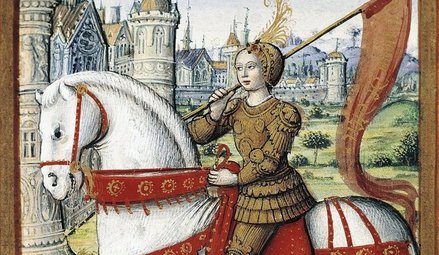
Jeanne d’Arc, « la plus belle histoire du monde »
Les papes ,
Histoires providentielles

La découverte du tombeau de saint Pierre à Rome
Histoires providentielles

La conversion autonome de la Corée
Les papes ,
Histoires providentielles

Le poème prophétique qui annonçait Jean-Paul II
Les saints ,
Histoires providentielles
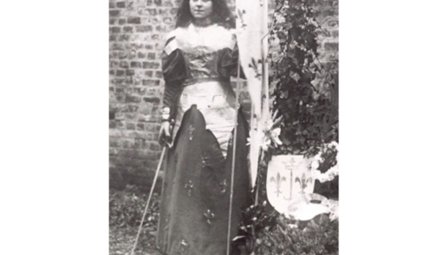
Thérèse de Lisieux, protectrice de ceux qui combattent
Histoires providentielles
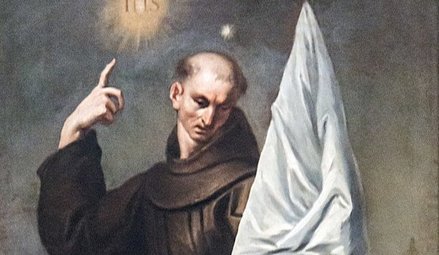
Jean de Capistran sauve l’Église et l’Europe
Histoires providentielles

La découverte de Notre-Dame de France par Edmond Fricoteaux
Les apparitions et interventions mariales ,
Histoires providentielles

Un évêque vietnamien tiré de prison par Marie
Les papes ,
Histoires providentielles
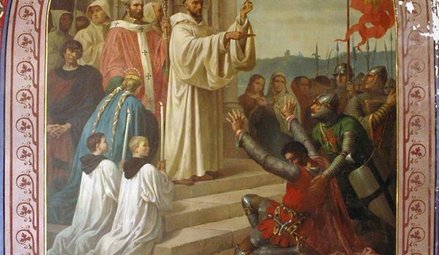
La réconciliation surnaturelle du duc d’Aquitaine
Les saints ,
Histoires providentielles

Et une grande lumière ouvrit la porte de son cachot…
Histoires providentielles
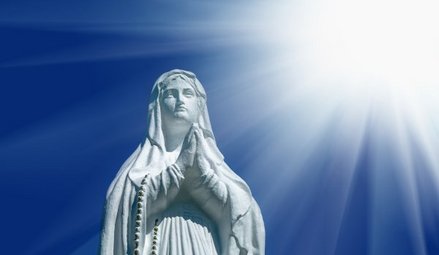
Le lancement des « Vierges pèlerines » dans le monde a été permis par la Providence de Dieu
Les saints ,
Histoires providentielles

Les prédictions et protections de Germain d’Auxerre pour sainte Geneviève
Marie ,
Histoires providentielles
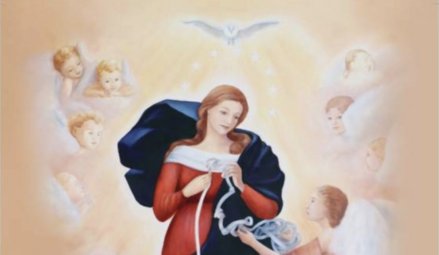
Marie qui défait les nœuds : le cadeau du pape François au monde
Histoires providentielles

Grigio, l’étrange chien de Don Bosco
Histoires providentielles

Julien Maunoir apprend miraculeusement le breton
Les apparitions et interventions mariales ,
Histoires providentielles

Il était censé mourir de froid dans les geôles soviétiques
Les martyrs ,
Histoires providentielles
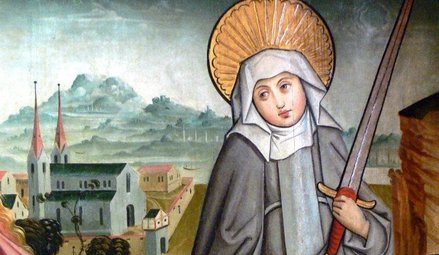
Les miracles de sainte Julienne
Histoires providentielles
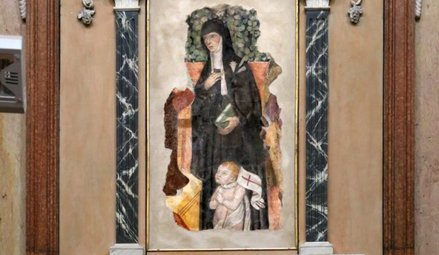
Une musique céleste réconforte Elisabetta Picenardi sur son lit de mort
Histoires providentielles
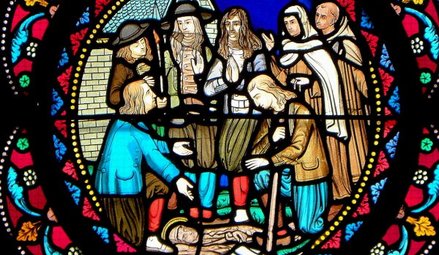
L’étrange aventure d’Yves Nicolazic
Guérisons miraculeuses ,
Histoires providentielles

Un agent secret protégé par Dieu
Histoires providentielles

Un couvent miraculeusement protégé de tous les maux
Les apparitions et interventions mariales ,
Conversions d'athées ,
Histoires providentielles
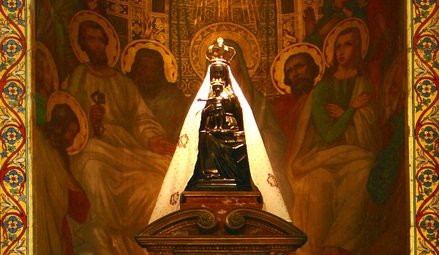
Pierre de Keriolet : avec Marie, nul ne se perd
Les saints ,
Histoires providentielles

La intuición sobrehumana de San Pacomio el Grande
Les saints ,
Histoires providentielles

The superhuman intuition of Saint Pachomius the Great
Les saints ,
Histoires providentielles

A protective hand saved John Paul II and led to happy consequences
Les apparitions et interventions mariales ,
Histoires providentielles

In 1947, a rosary crusade liberated Austria from the Soviets
Les saints ,
Histoires providentielles

Il doute de la Providence : Dieu lui envoie sept étoiles pour éclairer sa route
Les saints ,
Histoires providentielles

Una mano protectora salva a Juan Pablo II y conlleva providenciales repercusiones
Les apparitions et interventions mariales ,
Histoires providentielles

En 1947, una cruzada del rosario liberó a Austria de los soviéticos
Lacrymations et images miraculeuses ,
Histoires providentielles
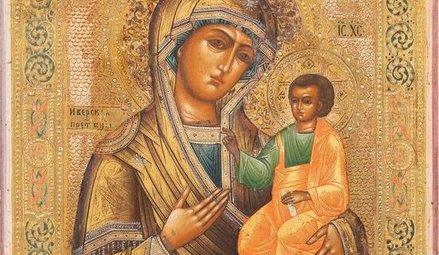
Perdue pendant plus d’un siècle, une icône russe réapparaît
Des miracles étonnants ,
Histoires providentielles

La lave s’arrête aux portes de l’église
Les saints ,
Histoires providentielles

Juana de Arco, "la historia más bella del mundo
Les saints ,
Histoires providentielles
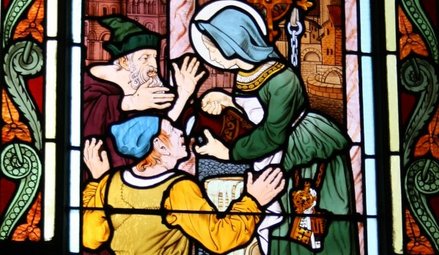
Zita et le miracle du manteau
Les saints ,
Histoires providentielles

L'intuizione sovrumana di San Pacomio il Grande
Les saints ,
Histoires providentielles

Joan of Arc: "the most beautiful story in the world"
Les saints ,
Histoires providentielles

Una mano protettiva ha salvato Giovanni Paolo II con ripercussioni provvidenziali
Les apparitions et interventions mariales ,
Histoires providentielles

Nel 1947, una crociata del rosario ha liberato l'Austria dai sovietici
Histoires providentielles
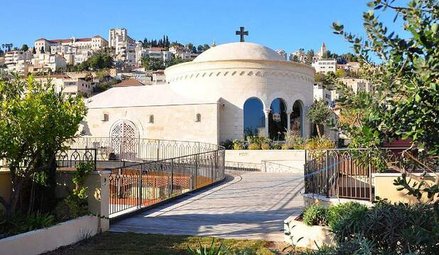
La découverte providentielle des bâtiments du Centre international Marie de Nazareth
Histoires providentielles

André Bobola prédit la renaissance de la Pologne
Les saints ,
Histoires providentielles

Giovanna d'Arco, "la storia più bella del mondo"
Histoires providentielles
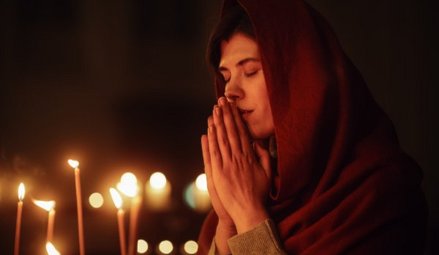
Les flammes purificatrices de Marie-Thérèse de Soubiran
Histoires providentielles
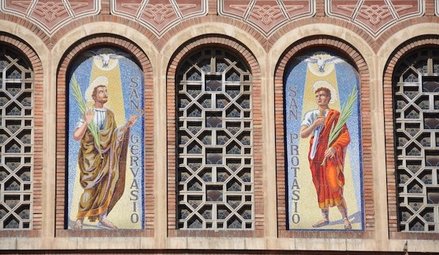
Ambroise de Milan retrouve les corps des martyrs Gervais et Protais
Histoires providentielles
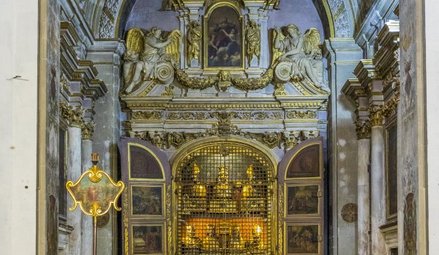
Apt : les reliques de sainte Anne retrouvées par miracle
Les papes ,
Histoires providentielles ,
1000RCInfo

The discovery of Saint Peter's tomb in Rome
Histoires providentielles

Au milieu des ruines, la cellule de Léopold Mandic est intacte
Histoires providentielles
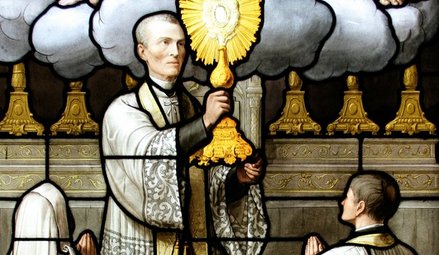
Pierre-Julien Eymard prie et Marie garde le collège
Les papes ,
Histoires providentielles

El descubrimiento de la tumba de San Pedro en Roma
Histoires providentielles
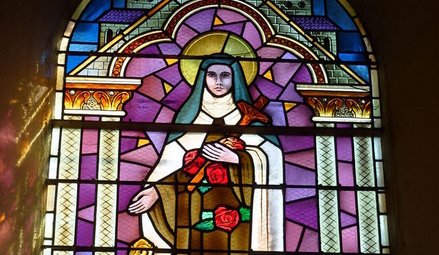
Thérèse de Lisieux sauve de la ruine un carmel italien
Les papes ,
Histoires providentielles

La scoperta della tomba di San Pietro a Roma
Histoires providentielles
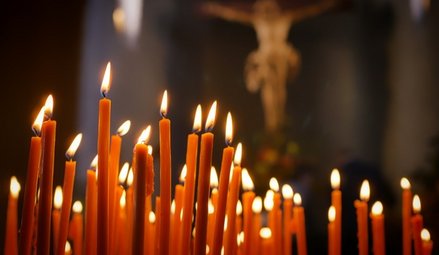
Du chemin des vaches à la communauté du Chemin Neuf
Histoires providentielles
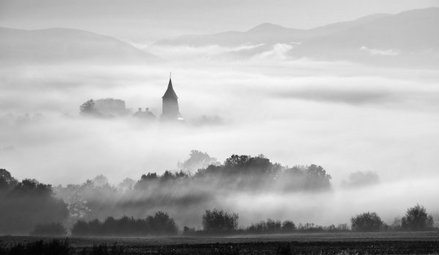
Notre Dame de la Clarté sauve sa chapelle bretonne
Histoires providentielles
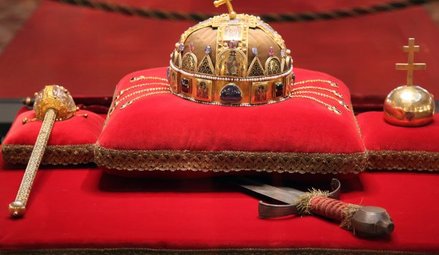
La couronne de saint Étienne de Hongrie
Histoires providentielles

Conversión autónoma de Corea
Histoires providentielles
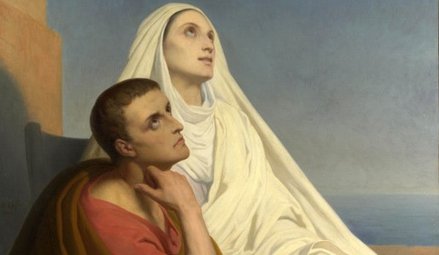
Dieu promet en songe à Monique la conversion de son fils
Histoires providentielles

How Korea evangelized itself
Histoires providentielles

La conversione autonoma della Corea
Histoires providentielles
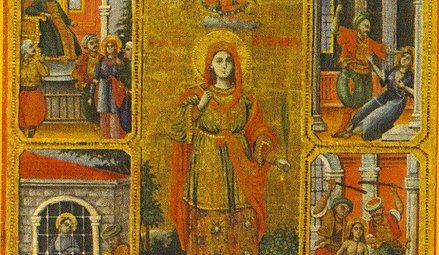
La dépouille de sainte Kyranna miraculeusement retrouvée 250 ans après son martyre
Les papes ,
Histoires providentielles

El poema profético que anunciaba a Juan Pablo II
Les saints ,
Histoires providentielles

Teresa de Lisieux, protectora de los que luchan
Histoires providentielles

Juan de Capistrano salva a la Iglesia y a Europa
Les papes ,
Histoires providentielles

The prophetic poem about John Paul II
Histoires providentielles

L’huile merveilleuse coule à l’abbaye de Bonneval
Les saints ,
Histoires providentielles

Thérèse of Lisieux saved countless soldiers during the Great War
Histoires providentielles

John of Capistrano saves the Church and Europe
Histoires providentielles
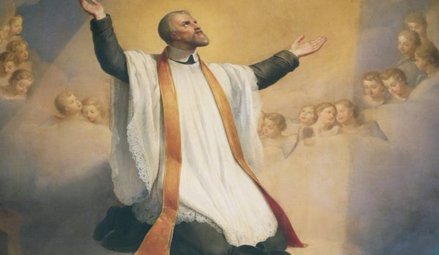
Vincent de Paul révèle sa vocation à Catherine Labouré
Les apparitions et interventions mariales ,
Histoires providentielles

Le chapelet et l’officier de la Grande Armée
Histoires providentielles

El descubrimiento de Notre-Dame de France por Edmond Fricoteaux
Les papes ,
Histoires providentielles

Il poema profetico che prefigurava Giovanni Paolo II
Histoires providentielles

Edmond Fricoteaux's providential discovery of the statue of Our Lady of France
Les saints ,
Histoires providentielles

Teresa di Lisieux, protettrice dei combattenti
Histoires providentielles

Giovanni da Capestrano salva la Chiesa e l'Europa
Les papes ,
Histoires providentielles

The supernatural reconciliation of the Duke of Aquitaine
Les apparitions et interventions mariales ,
Histoires providentielles

Mary frees Vietnamese bishop from prison
Les papes ,
Histoires providentielles

La reconciliación sobrenatural del duque de Aquitania
Les apparitions et interventions mariales ,
Histoires providentielles

Marie excarcela a un obispo vietnamita
Histoires providentielles

La Guadalupe espagnole
Histoires providentielles

La scoperta di Notre-Dame de France da parte di Edmond Fricoteaux
Les saints ,
Histoires providentielles

Gury of Kazan: freed from his prison by a "great light"
Histoires providentielles

Global launch of "Pilgrim Virgins" was made possible by God's Providence
Les saints ,
Histoires providentielles

Y una gran luz abrió la puerta de su calabozo...
Histoires providentielles

El lanzamiento de las "Vírgenes Peregrinas" por todo el mundo fue posible gracias a la Providencia de Dios
Histoires providentielles

Saint Martin est sauvé du feu par la prière
Histoires providentielles

Une image de la Vierge Marie à l’épreuve des bombes
Les papes ,
Histoires providentielles

La riconciliazione soprannaturale del duca d'Aquitania
Les apparitions et interventions mariales ,
Histoires providentielles

Un vescovo vietnamita liberato dal carcere da Maria
Histoires providentielles

Jésus retarde le décès de Lizzie
Les saints ,
Histoires providentielles

Germanus of Auxerre's prophecy about Saint Genevieve's future mission, and protection of the young woman
Les saints ,
Histoires providentielles

Predicciones y protecciones de Germain d'Auxerre para Saint Geneviève
Marie ,
Histoires providentielles ,
_TopNL

María, la que desata los nudos: el regalo del Papa Francisco al mundo
Marie ,
Histoires providentielles

Mary Undoer of Knots: Pope Francis' gift to the world
Les saints ,
Histoires providentielles

E una grande luce aprì la porta della sua prigione...
Histoires providentielles

Il lancio delle "Vergini pellegrine" in tutto il mondo è stato reso possibile dalla Provvidenza di Dio
Histoires providentielles

Saint Géraud et le miracle des fruits à Braga
Les saints ,
Histoires providentielles

I pronostici di Germano d'Auxerre e la protezione di Santa Genoveffa
Marie ,
Histoires providentielles

Maria che scioglie i nodi: il dono di Papa Francesco al mondo
Les saints ,
Histoires providentielles

Jeanne de Chantal et François de Sales : une rencontre préparée par Dieu
Histoires providentielles

Don Bosco's angel dog: Grigio
Histoires providentielles
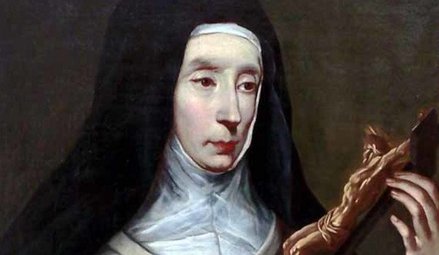
La prière de sœur Marie des Anges sauve deux fois Turin
Histoires providentielles

Grigio, el extraño perro de Don Bosco
Histoires providentielles

Grigio, lo strano cane di Don Bosco
Histoires providentielles

Julien Maunoir miraculously learns Breton
Histoires providentielles

Julien Maunoir impara miracolosamente il bretone
Les apparitions et interventions mariales ,
Histoires providentielles

He should have died of hypothermia in Soviet jails
Histoires providentielles

Julian Maunoir aprende bretón milagrosamente
Les martyrs ,
Histoires providentielles

The miracles of Saint Juliana of Nicomedia
Histoires providentielles

Heavenly music comforts Elisabetta Picenardi on her deathbed
Les apparitions et interventions mariales ,
Histoires providentielles

Avrebbe dovuto morire di freddo nelle carceri sovietiche
Les apparitions et interventions mariales ,
Histoires providentielles

Se suponía que iba a morir congelado en las cárceles soviéticas
Les martyrs ,
Histoires providentielles

I miracoli di Santa Giuliana
Les martyrs ,
Histoires providentielles

Los milagros de Santa Juliana
Histoires providentielles

Una música celestial consuela a Elisabetta Picenardi en su lecho de muerte
Histoires providentielles

Una musica celestiale conforta Elisabetta Picenardi sul letto di morte
Histoires providentielles

The strange adventure of Yves Nicolazic
Guérisons miraculeuses ,
Histoires providentielles

God protects a secret agent
Histoires providentielles

La extraña aventura de Yves Nicolazic
Guérisons miraculeuses ,
Histoires providentielles

Un agente secreto protegido por Dios
Histoires providentielles

Un convento milagrosamente protegido de todos los males
Les apparitions et interventions mariales ,
Conversions d'athées ,
Histoires providentielles

Pierre de Keriolet: con María, nadie se pierde
Histoires providentielles
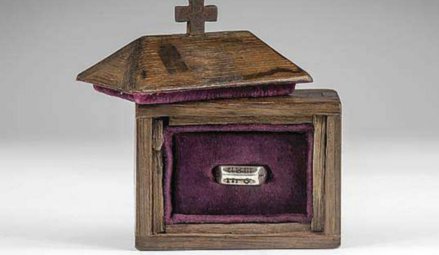
Retour de l’anneau de Jeanne d’Arc en France : une affaire providentielle
Histoires providentielles

La strana avventura di Yves Nicolazic
Guérisons miraculeuses ,
Histoires providentielles

Un agente segreto protetto da Dio
Les saints ,
Histoires providentielles

Duda de la Providencia: Dios le envía siete estrellas para iluminar su camino
Histoires providentielles

Syrian monastery shielded from danger multiple times
Les apparitions et interventions mariales ,
Conversions d'athées ,
Histoires providentielles

Pierre de Keriolet: with Mary, one cannot be lost
Lacrymations et images miraculeuses ,
Histoires providentielles

Reaparece un icono ruso perdido durante más de un siglo
Les saints ,
Histoires providentielles

Seven golden stars reveal the future location of the Grande Chartreuse Monastery
Lacrymations et images miraculeuses ,
Histoires providentielles

Lost for over a century, a Russian icon reappears
L’Église ,
Histoires providentielles
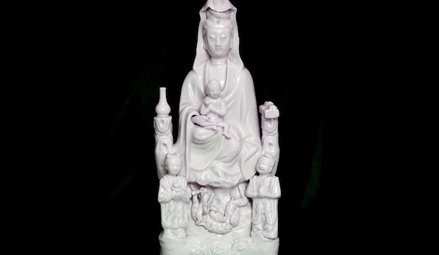
Le miracle de la transmission de la foi dans l’Église cachée japonaise
Des miracles étonnants ,
Histoires providentielles

Flowing lava stops at church doors
Histoires providentielles

Un convento miracolosamente protetto da ogni male
Les apparitions et interventions mariales ,
Conversions d'athées ,
Histoires providentielles

Pierre de Keriolet: con Maria non si perde nessuno
Des miracles étonnants ,
Histoires providentielles

La lava se detiene a las puertas de la iglesia
Les saints ,
Histoires providentielles

Dubita della Provvidenza e Dio gli manda sette stelle per illuminare il suo cammino
Lacrymations et images miraculeuses ,
Histoires providentielles

Persa da più di un secolo, riappare un'icona russa
Les saints ,
Histoires providentielles

Saint Zita and the miracle of the cloak
Les saints ,
Histoires providentielles

Zita y el milagro de la capa
Histoires providentielles

El providencial descubrimiento de los edificios del Centro Internacional María de Nazaret
Histoires providentielles

Andrés Bobola predice el renacimiento de Polonia
Des miracles étonnants ,
Histoires providentielles

La lava si ferma alle porte della chiesa
Histoires providentielles

Dieu charge le petit Bénézet de bâtir un grand pont
Les saints ,
Histoires providentielles

Zita e il miracolo del mantello
Témoignages de rencontres avec le Christ ,
Histoires providentielles

Frappée par la foudre, Gloria se tient aux portes de l’enfer
Histoires providentielles

The providential finding of the Mary of Nazareth International Center's future site
Histoires providentielles

A hundred years before it happened, Saint Andrew Bobola predicted that Poland would be back on the map
Histoires providentielles

La conversion de Fabrice Amedeo, au beau milieu de l’océan
Histoires providentielles

The purifying flames of Sophie-Thérèse de Soubiran La Louvière
Histoires providentielles








